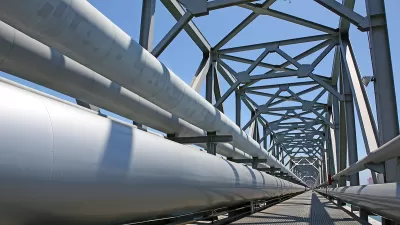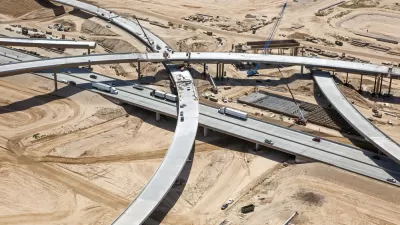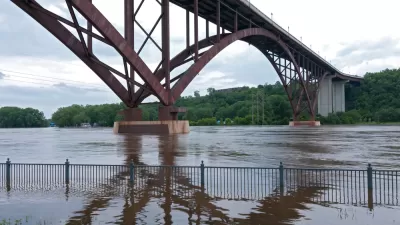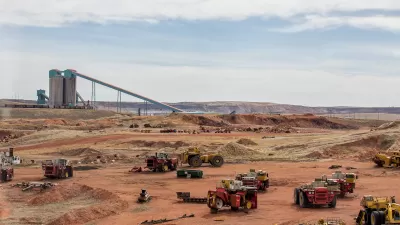In a move called "one of the biggest — and most audacious — deregulatory actions of the Trump administration," President Trump yesterday announced plans to weaken the National Environmental Policy Act for federal infrastructure projects.

"President Trump on Wednesday unilaterally weakened one of the nation’s bedrock conservation laws, the National Environmental Policy Act, limiting public review of federal infrastructure projects to speed up the permitting of freeways, power plants and pipelines," reports Lisa Friedman.
"In doing so, the Trump administration claimed it will save hundreds of millions of dollars over almost a decade by significantly reducing the amount of time allowed to complete reviews of major infrastructure projects."
The move culminates years of small steps and threats (or promises, depending on your perspective), to ease permitting processes for infrastructure projects in the United States by rolling back the protections of NEPA.
- During the State of the Union delivered in January 2018, for instance, President Trump promised to ease permitting processes but without mentioning specifics.
- In April 2018, "Trump administration agencies, including Transportation, Housing, Interior and Energy, signed an administration memo Monday pledging to speed up permitting on major infrastructure projects using a two-year target," according to an article by Michael Laris, but no specific mention of NEPA yet.
- In August 2018, the Trump administration's focus on NEPA became a little more clear, as the U.S. Department of Transportation announced new policies that required much shorter NEPA documentation, and located oversight of NEPA processes to one federal agency.
- Lisa Friedman reported in January 2020 on a proposed rule that removed the requirement to consider climate change in NEPA reviews. Additional coverage by The Washington Post and Yale Climate Connections offers additional insight about the potential consequences of the proposed rule change.
- And then in June 2020, the Trump administration was reported to be in preparation of an executive order waving protections of both NEPA and the Endangered Species Act.
Regarding more specific details of the changes enacted by President Trump this week, Friedman explains:
The final rule sets new hard deadlines of between one and two years to complete environmental studies, according to two people who have seen the document but were not authorized to speak about it publicly.
The rule will also allow agencies to develop categories of activities that do not require an environmental assessment at all.
And in one of the most bitterly contested provisions, the rule would free federal agencies from having to consider the impacts of infrastructure projects on climate change. It does so by eliminating the need for agencies to analyze a project’s indirect or “cumulative” effects on the environment and specifying they are only required to analyze “reasonably foreseeable” impacts.
President Trump announced the change during an appearance at the U.P.S. Hapeville Airport Hub in Atlanta. The Associated Press provided a report on the announcement as well. In each article, critics are quick to speak out against the changes, and predict that rolling back NEPA will fail to provide an economic boost, as president Trump promises.
FULL STORY: Trump Weakens Major Conservation Law to Speed Construction Permits

Alabama: Trump Terminates Settlements for Black Communities Harmed By Raw Sewage
Trump deemed the landmark civil rights agreement “illegal DEI and environmental justice policy.”

Study: Maui’s Plan to Convert Vacation Rentals to Long-Term Housing Could Cause Nearly $1 Billion Economic Loss
The plan would reduce visitor accommodation by 25% resulting in 1,900 jobs lost.

Planetizen Federal Action Tracker
A weekly monitor of how Trump’s orders and actions are impacting planners and planning in America.

Federal Homelessness Agency Places Entire Staff on Leave
The U.S. Interagency Council on Homelessness is the only federal agency dedicated to preventing and ending homelessness.

Restoring Northern India’s Himalayan ‘Water Temples’
Thousands of centuries-old buildings protect the region’s natural springs and serve as community wells and gathering places.

Milwaukee to Double Bike Share Stations
Bublr Bikes, one of the nation’s most successful, will add 500 new e-bikes to its system.
Urban Design for Planners 1: Software Tools
This six-course series explores essential urban design concepts using open source software and equips planners with the tools they need to participate fully in the urban design process.
Planning for Universal Design
Learn the tools for implementing Universal Design in planning regulations.
Caltrans
Smith Gee Studio
Institute for Housing and Urban Development Studies (IHS)
City of Grandview
Harvard GSD Executive Education
Toledo-Lucas County Plan Commissions
Salt Lake City
NYU Wagner Graduate School of Public Service





























